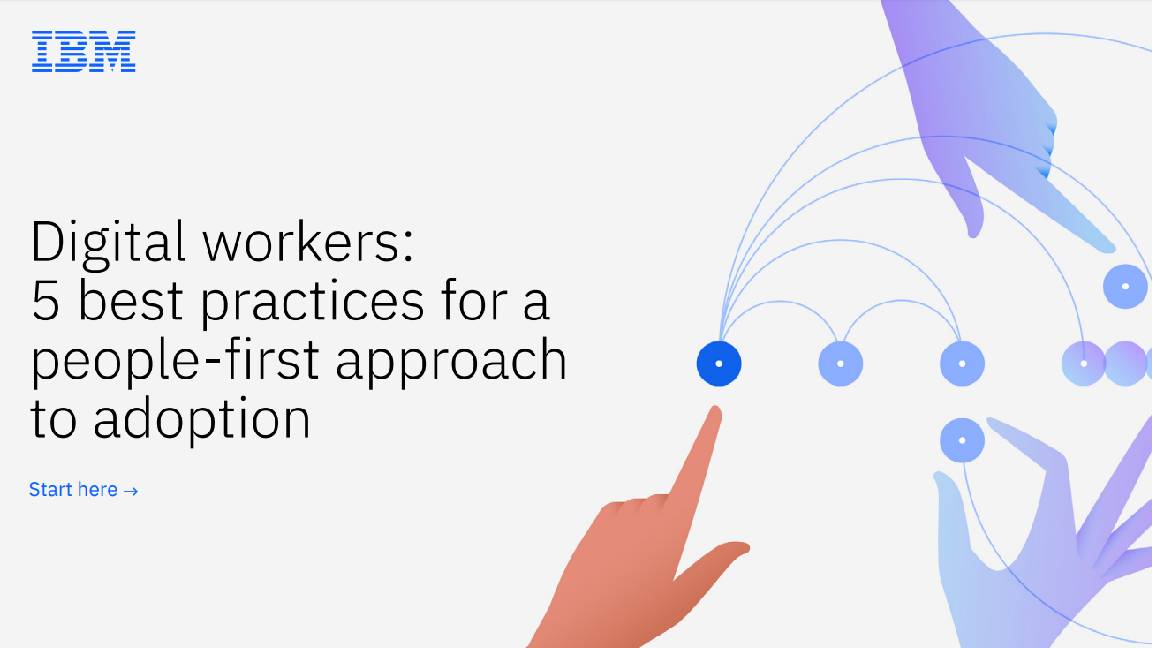AI skills training can't be left in the hands of big tech
Speakers at Turing's AI UK conference lay out challenges to AI skills readiness


The government must intervene in upskilling workers for the AI revolution, with industry experts warning it can't be left to industry alone.
That's the assessment offered by a panel of digital training experts speaking at AI UK, the annual conference held by the Alan Turing Institute.
The rise of AI has many concerned about the impact on jobs, suggesting a degree of retraining will be needed to help humans keep pace with the technology — or find a new role entirely. Those left behind without AI skills will be stuck in less well paying jobs, according to one report.
Beyond that, tech giants and governments alike are concerned about the lack of AI talent coming through the pipeline, with a shortage of skilled AI experts predicted to slow innovation — that's the motivation behind the UK's AI Action Plan, which aims to create 13,000 jobs in the industry.
But while meeting this expected demand will be a cross-sector challenge, David Crozier, director of the AI Collaboration Centre (AICC), noted that filling future gaps can’t be left to tech companies.
“Industry only supports it [training efforts] if they see commercial opportunity at the end of it,” he told attendees.
But there's more to AI than just productivity for companies, notes Tom Crick, Professor of Digital Education & Policy at Swansea University and the Chief Scientific Adviser (CSA) at the Department for Culture, Media and Sport. Beyond the economy, AI has a very clear social and cultural imperative.
Sign up today and you will receive a free copy of our Future Focus 2025 report - the leading guidance on AI, cybersecurity and other IT challenges as per 700+ senior executives
"The lens through which you view AI upskilling, for this to be responsible and ethical, and be citizen centered — is this of benefit to citizens and society, not just that it will help get a job or as an industry thing," he said.
"The pace of change is so quick, it really needs a nation wide or region wide intervention," added Crozier, comparing it — rather surprisingly — to sheep dipping, the process by which the animals are treated with pesticides to avoid the spread of parasites.
That said, the panelists agreed there was a role for companies to make use of micro-learning and offer life-long learning opportunities to enable employees to keep up. Liz Williams, the CEO of FutureDotNow, called for a cultural change in these topics, to centre them in our work lives.
Existing skills gap
Perhaps we shouldn't get ahead of ourselves. Williams noted that her organization's research suggests more than half of the UK workforce currently lack the essential 20 or so digital skills for work — and that's before AI comes into the picture.
"These are not advanced skills. Nine of the tasks are about online safety and security," she said, such as passwords. "People do not necessarily have those skills."
Williams noted that this applies across all demographics. One-in-two academics, for example, lacks one of 20 digital skills designated as necessary in the modern workforce, as do half of young people.
"It's a really ubiquitous issue," she said. "We assume people will acquire these skills through osmosis, but they won't. We need to help them acquire and maintain those skills."
Confused companies
It's not just individuals struggling to see how they will stay relevant amid a rise in AI in the workplace. Company leaders are unsure of how to best use AI, added Crozier.
Discussing company leaders who came to his organization for support, Crozier said they admitted they lacked the core skills needed to implement AI, let alone their staff.
"They didn't know what they needed to procure, a lot of the individuals we engaged with, their understanding of AI was pretty limited — they understand ChatGPT or Copilot, and they use it as a glorified Google."
RELATED WHITEPAPER

To help, Crozier said he's been trying to explain the broader underlying technologies, while asking them what specific problems they're trying to solve, while also addressing issues like costs and ROI.
"It's not just about basic AI literacy, the leadership in those organizations are crying out for advice and guidance and a bit more knowledge — and perhaps they're a little bit embarrassed about their lack of understanding."
MORE FROM ITPRO
- The AI skills gap is prompting a widespread rethink on workforce upskilling
- AI skills are the ticket to the best paid tech jobs in 2024
- The UK’s AI ambitions face one major hurdle – finding enough home-grown talent
Freelance journalist Nicole Kobie first started writing for ITPro in 2007, with bylines in New Scientist, Wired, PC Pro and many more.
Nicole the author of a book about the history of technology, The Long History of the Future.
-
 "We want AI to work for Britain": The UK government wants to upskill 10 million Brits in AI by 2030 – and the courses are free to access
"We want AI to work for Britain": The UK government wants to upskill 10 million Brits in AI by 2030 – and the courses are free to accessNews The nationwide upskilling push aims to help UK workers capitalize on the generative AI boom
-
 Business leaders are using AI as a “license to reduce headcount” – new Morgan Stanley research lays bare the impact on UK workers
Business leaders are using AI as a “license to reduce headcount” – new Morgan Stanley research lays bare the impact on UK workersNews Analysis of five sectors highlights an "early warning sign" of AI’s impact on jobs
-
 Lloyds Banking Group wants to train every employee in AI by the end of this year – here's how it plans to do it
Lloyds Banking Group wants to train every employee in AI by the end of this year – here's how it plans to do itNews The new AI Academy from Lloyds Banking Group looks to upskill staff, drive AI use, and improve customer service
-
 CEOs are fed up with poor returns on investment from AI: Enterprises are struggling to even 'move beyond pilots' and 56% say the technology has delivered zero cost or revenue improvements
CEOs are fed up with poor returns on investment from AI: Enterprises are struggling to even 'move beyond pilots' and 56% say the technology has delivered zero cost or revenue improvementsNews Most CEOs say they're struggling to turn AI investment into tangible returns and failing to move beyond exploratory projects
-
 Companies continue to splash out on AI, despite disillusionment with the technology
Companies continue to splash out on AI, despite disillusionment with the technologyNews Worldwide spending on AI will hit $2.5 trillion in 2026, according to Gartner, despite IT leaders wallowing in the "Trough of Disillusionment" – and spending will surge again next year.
-
 A new study claims AI will destroy 10.4 million roles in the US by 2030, more than the number of jobs lost in the Great Recession – but analysts still insist there won’t be a ‘jobs apocalypse’
A new study claims AI will destroy 10.4 million roles in the US by 2030, more than the number of jobs lost in the Great Recession – but analysts still insist there won’t be a ‘jobs apocalypse’News A frantic push to automate roles with AI could come back to haunt many enterprises, according to Forrester
-
 Businesses aren't laying off staff because of AI, they're using it as an excuse to distract from 'weak demand or excessive hiring'
Businesses aren't laying off staff because of AI, they're using it as an excuse to distract from 'weak demand or excessive hiring'News It's sexier to say AI caused redundancies than it is to admit the economy is bad or overhiring has happened
-
 Lisa Su says AI is changing AMD’s hiring strategy – but not for the reason you might think
Lisa Su says AI is changing AMD’s hiring strategy – but not for the reason you might thinkNews AMD CEO Lisa Su has revealed AI is directly influencing recruitment practices at the chip maker but, unlike some tech firms, it’s led to increased headcount.


